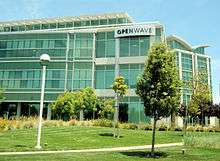Openwave
 | |
| Industry | Mobile Data Software & Services |
|---|---|
| Founded | United States (August 2000)[1] |
| Founder | Alain Rossmann |
| Website | OPENWAVE |

Openwave (formerly software.com, phone.com, and Libris, Inc) has changed its name to Unwired Planet, and two of its former products have launched as private companies; Openwave Mobility and Openwave Messaging. Openwave is historically significant in its introduction of the Mobile Internet and its expansion into a large successful mobile software supplier in the mobile telecom sector.
Openwave pioneered HDML, a precursor to WML. Openwave was a founding member of the WAP Forum.
History
The company started in 1996 as Libris, Inc. and focused on developing mobile client software for "pull" services while the general mobile market was rapidly growing "push" services based on SMS. In 1996, it changed its name to Unwired Planet, Inc. and launched its proprietary end-to-end mobile network solution for Internet access and web browsing, known as up.link (browser and network server/gateway).
In 1999, with the introduction of WAP standards, it acquired Apiion, Ltd. of Belfast (formerly Aldiscon Northern Ireland, Ltd.), changed its name to Phone.com and went public on the NASDAQ. In 2000, amidst huge growth in revenue and stock price, Phone.com acquired several high tech startup companies with niche products to integrate across its end-to-end solution. In 2001, it merged with Software.com and changed the company name again to Openwave Systems, Inc. With Software.com's large installed base of email servers at ISPs, Openwave expanded by providing its mobile operator customers with software infrastructure for mobile email applications and other multimedia messaging (MMS) applications.
The company's mobile browser software shipped on over one billion handsets,[2] at one point approx 49% of the global browser-capable device shipments, over 70 mobile operators.[1]
In 2002 it acquired SignalSoft Corp., the developer of Location Based Services, who developed the first platforms to provide E911 services as per the first FCC (Federal Communications Commission) requirements.
In 2004 Openwave acquired Nombas Inc., the developer of Cmm (a scripting language with C-like syntax) which was later enhanced to support ECMAScript and renamed ScriptEase.
In January 2006, Openwave closed the $120 million acquisition of Musiwave, a French music application services provider for mobile phones founded by Gilles Babinet. In November 2007, the company sold Musiwave to Microsoft for $46 million.[3] In the same year, Openwave was alleged of violating securities laws by issuing misleading financial statements. [4]
In February 2008, Openwave launched a contextual advertising system for mobile phones.[5]
In May 2008, the San Francisco Business Journal reported that NASDAQ had given Openwave a delisting warning for failing to properly report some financial results.[6]
On June 30, 2008, Openwave issued a press release stating: "that Purple Labs has acquired the Openwave mobile phone software business, which develops and markets its browser and messaging client technologies.".[7]
On October 18, 2010, Openwave announced: "that it licensed certain patents to Mobixell/724 Solutions Inc" as part of an intellectual property protection arrangement.[8]
On May 1, 2012, Openwave announced: "the completion of the sale of its Mediation and Messaging product businesses to Marlin Equity Partners." Openwave changed its name back to Unwired Planet. They are now exclusively focused on licensing and enforcement of IP that they claim is “foundational to mobile communications.”[9] In response to claims that the company has become a patent troll, Unwired Planet's general counsel Noah Mesel states: "We happen to be at the point in our business cycle where what’s left is a patent portfolio."[9]
The former product businesses have also re-launched as two privately held companies, Openwave Mobility Inc. and Openwave Messaging Inc.
In 2013 Openwave Messaging acquired Critical Path.
Products
Major current products include:
Openwave Mobility
- Integra (platform)
- Media Optimizer
- Web Optimizer
- Mobile Analytics
- Promotion Pricing & Innovation
- Smart User Repository
Openwave Messaging
- Email Mx
- Network Message Store
- Voice and Video Messaging
- Universal Messaging Suite
- Multimedia Messaging Service Center
- App Suite
- Rich Mail
- Edge GX
Earlier products included:
- Openwave Email Kx
- Openwave Mobile Access Gateway (MAG)
- Openwave Mobile Browser
- Openwave Mobile Messaging client
- Unwired Planet .Link Browser
- Unwired Planet .Link Server
See also
References
- 1 2 "About Openwave". Openwave Systems Inc. Retrieved 2011-04-22.
- ↑ Openwave Announces Mobile Browser Integration for Qualcomm's BREW solution, 12 September 2006
- ↑ Microsoft Snares Musiwave for $46M, 15 November 2007
- ↑ "Bernstein Litowitz Berger & Grossmann LLP Announces Notice Regarding Class Action Suit against Openwave Systems Inc. and Certain of Its Senior Officers and Directors". March 14, 2007. Retrieved Jul 14, 2013.
- ↑ Openwave launches contextual advertising solution - FierceMobileContent
- ↑ Thursday, 22 May, 2008, retrieved 2008-06-12
- ↑ Monday, 30 June, 2008, retrieved 2008-07-01
- ↑
- 1 2 http://www.bloomberg.com/news/articles/2015-10-02/nevada-patent-troll-takes-on-google-samsung-in-london-court